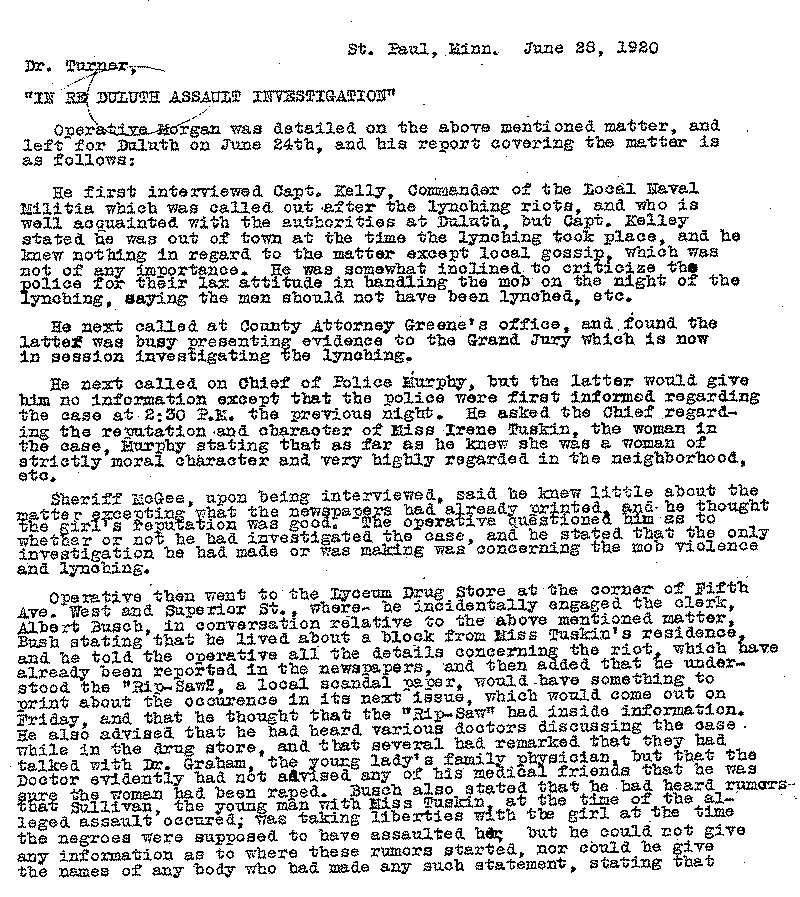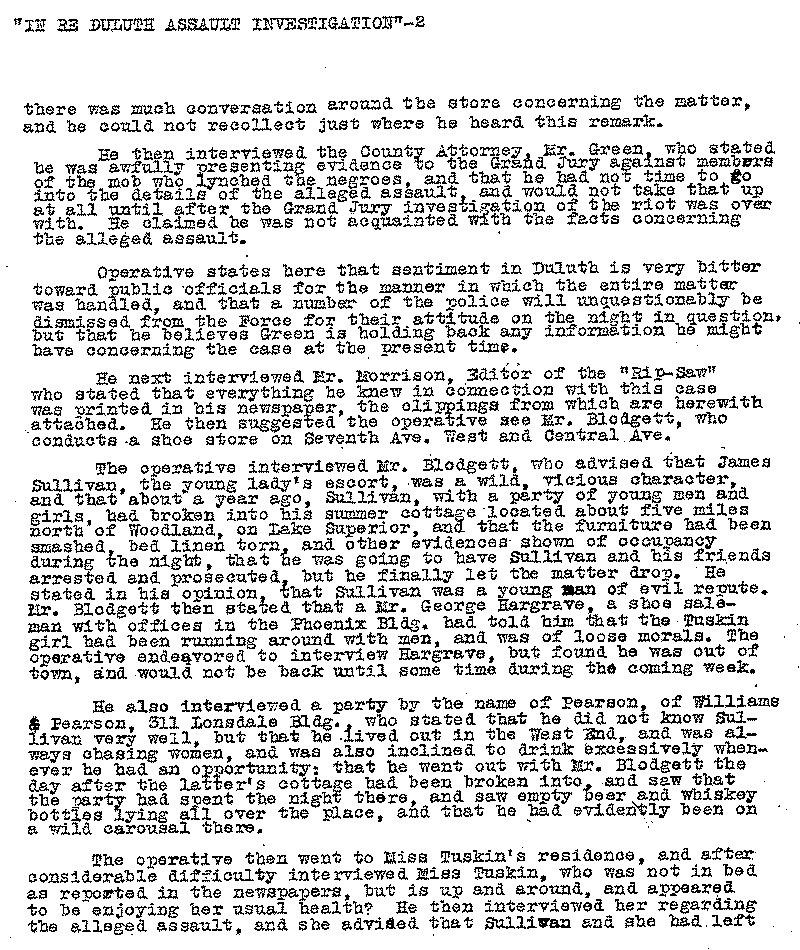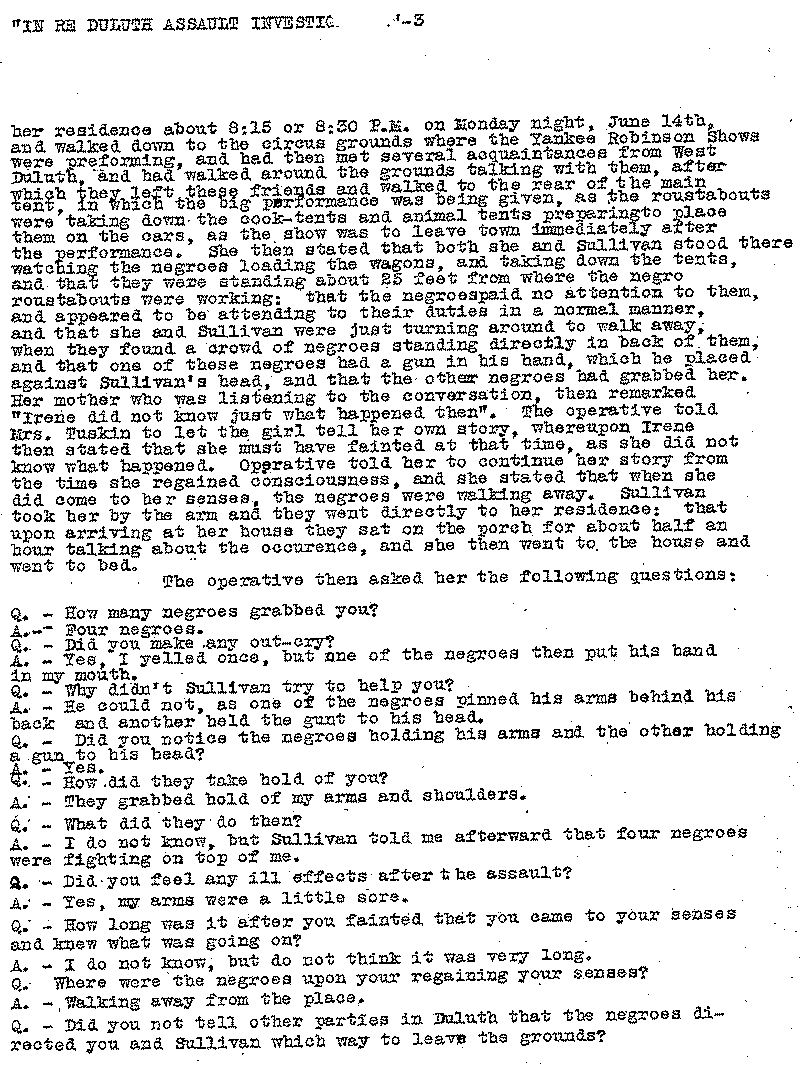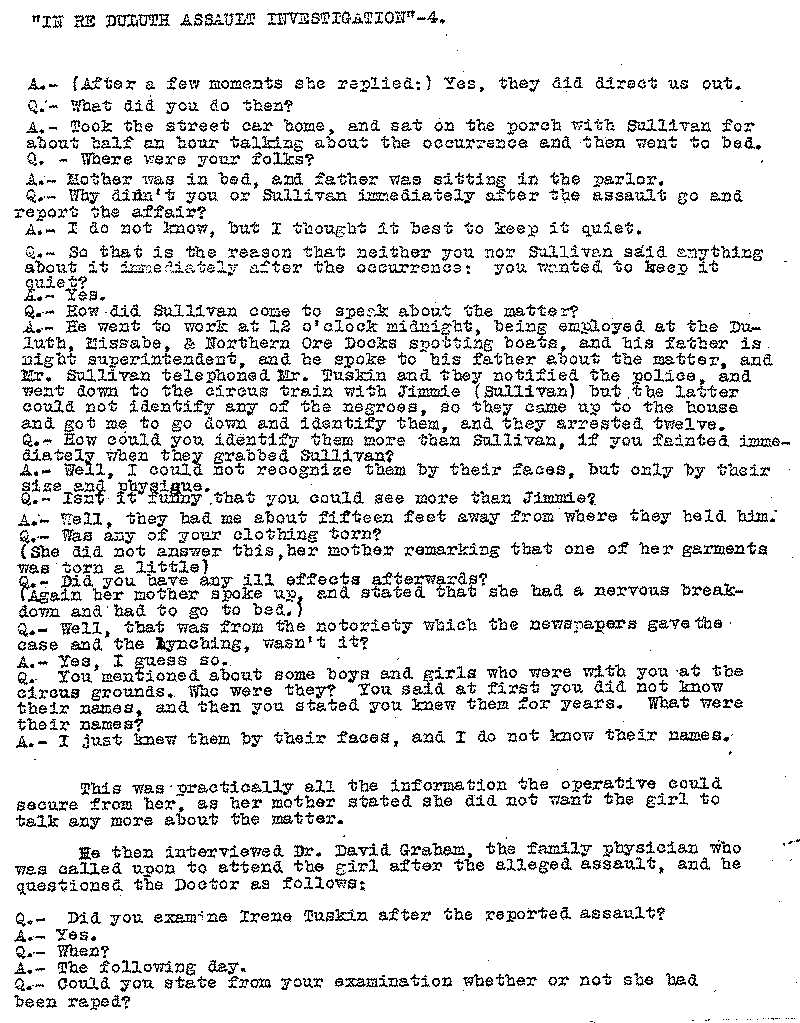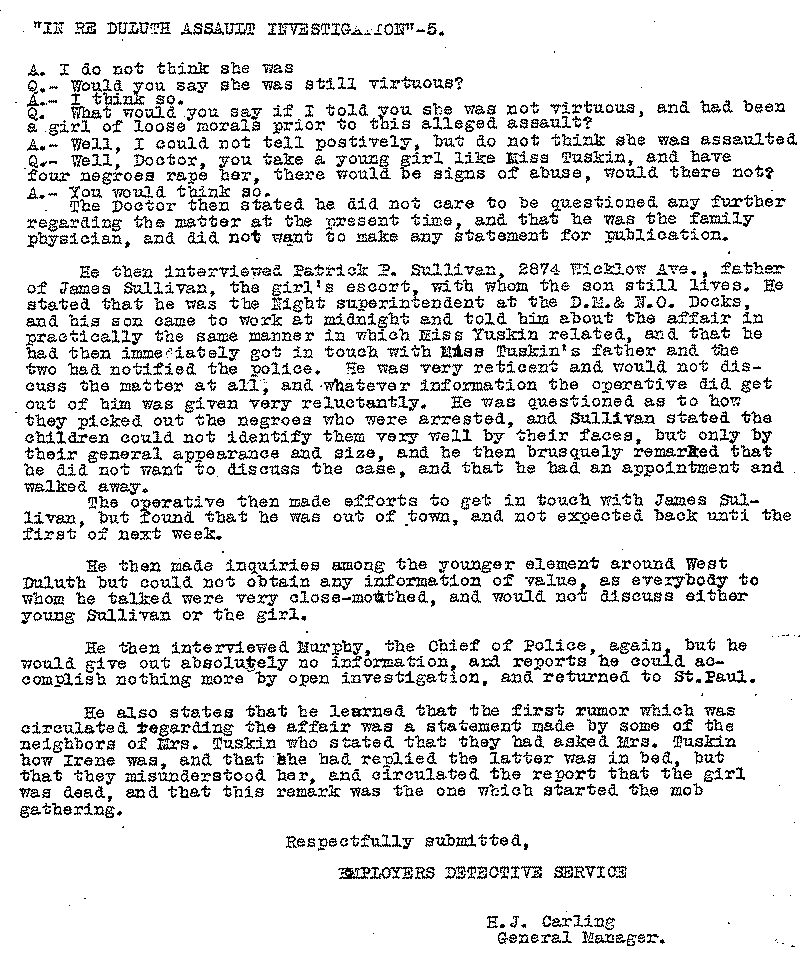"Operative Morgan" Report, June 28, 1920.
Type of event: Lynchings
Location: Minnesota; United States
Addressee: J. A. A. Burnquist
Addressor: W. T. Francis
Citation:
Minnesota. Governor (1915-1921: Burnquist).
Records.
Subject Files (File 648c): Duluth Lynchings, 1920.
Letter from W. T. Francis to J. A. A. Burnquist, July 3, 1920.
Image text
LAW OFFICE OF
WILLIAM T. FRANCIS
SUITE 239 METROPOLITAN BUILDING
ST. PAUL, MINN.
July 3 – 1920
My Dear Governor—
Herewith copy of
report of the Special Investigator sent to Duluth by the St. Paul Branch of the
N. A. A. C. P. on the Duluth alleged criminal assault.
Yours
Truly,
W. T. Francis
St. Paul, Minn. June 28, 1920
Dr. Turner,
“IN RE DULUTH ASSAULT
INVESTIGATION”
Operative Morgan was detailed on the above mentioned
matter, and left for Duluth on June 24th, and his report covering the matter is
as follows:
He first interviewed Capt. Kelly, Commander of the local Naval
Militia which was called out after the lynching riots, and who is well
acquainted with the authorities at Duluth, but Capt. Kelley stated he was out of
town at the time the lynching took place, and he knew nothing in regard to the
matter except local gossip which was not of any importance. He was somewhat
inclined to criticize the police for their lax attitude in handling the mob on
the night of the lynching, saying the men should not have been lynched,
etc.
He next called at County Attorney Greene's office, and found the latter
eras busy presenting evidence to the Grand fury which is now in session
investigating he lynching.
He next called on Chief of Police Murphy but the
latter would give him no information except that the police were first informed
regarding the case at- 2:30 P.M. the previous night. He asked the Chief
regarding the reputation and character of Miss Irene Tuskin, the woman in the
case, Murphy stating that as far as he knew she was a woman of strictly moral
character and very highly regarded in the neighborhood, etc.
Sheriff McGee,
upon being interviewed, said he knew little about the matter, excepting what the
newspapers had already printed and he thought he girl’s reputation was
good. The operative questioned him as to whether or not he had investigated the
case, and he stated that the only investigation he had made or was making was
concerning the mob violence and lynching.
Operative then went to the Lyceum
Drug Store at the corner of Fifth Ave. West and Superior St., Where he
incidentally engaged the clerk, Albert Busch, in conversation relative to the
above mentioned matter, Bush stating that he lived about a block from Miss
Tuskin's residence, and he told the operative all the details concerning the
riot which have already been reported in the newspapers and then added that he
understood the "Rip-Saw”, a local scandal paper, would have something to
print about the occurrence in its next issue, which would come out on Friday,
and that he thought that the "Rip-Saw" had inside information. He also advised
that he had heard various doctors discussing the case. While in the drug store,
and that several had remarked that they had talked with Dr. Graham, the young
lady's family physician but that the Doctor evidently had not advised any of his
medical friends that he was sure the woman had been raped. Busch also stated
that he had heard rumor that Sullivan, the young man with Miss Tuskin at the
time of the alleged assault occurred; was taking liberties with the girl at the
time the negroes were supposed to have assaulted her but he could not give any
information as to where these rumors started, nor could he give the names of any
body who had made any such statement, stating that
there was much conversation around the store concerning the matter, and
he could not recollect just where be heard this remark.
He then interviewed
the County Attorney, Mr. Green who stated he was awfully presenting evidence to
the Grand jury against members of the mob who lynched the negroes, and that he
had not time to go into the details of the alleged assault and would not take
that up at all until after the Grand fury investigation of the riot was over
with. He claimed he was not acquainted with the facts concerning the alleged
assault.
Operative states here that sentiment in Duluth is very bitter toward
public officials for the manner in which the entire matter was handled, and that
a number of the police will unquestionably be dismissed from the Force for their
attitude on the night in question, but that he believes Green is holding back
any information he might have concerning the case at the present time.
He
next interviewed Mr. Morrison, Editor of the "Rip-Saw" who stated that
everything he knew in connection with this case was printed in his newspaper,
the clippings from which are herewith attached. He then suggested the operative
see Mr. Blodgett, who conducts a shoe store on Seventh Ave. West and Central
Ave.
The operative interviewed Mr. Blodgett, who advised that James Sullivan, the young lady’s escort, was a wild, vicious character, and that about a year ago, Sullivan, with a party of young men and girls, had broken into his summer cottage located about five miles north of Woodland, on Lake Superior, and that the furniture had been smashed, bed linen torn and other evidences shown of occupancy during the night, that he was going to have Sullivan and his friends arrested and prosecuted but he finally let the matter drop. He stated in his opinion that Sullivan was a young man of evil repute. Mr. Blodgett then stated that a Mr. George Hargrave, a shoe salesman with offices in the Phoenix Bldg. had told him that the Tuskin girl had been running around with men, and was of loose morals. The operative endeavored to interview Hargrave, but found he was out of town, and would not be back until some time during the coming week.
He also interviewed a party by the name of Pearson , of Williams & Pears on, 311 Lonsdale Bldg. who stated that he did not know Sullivan very well, but that he lived out in the West End, and was always chasing women, and was also inclined to drink excessively whenever he had an opportunity: that he went out with Mr. Blodgett the day after the latter's cottage had been broken into, and saw that the party had spent the night there, and saw empty beer and whiskey bottles all over the place, and that he laced evidently been on a wild carousal there.
The operative then went to Miss Tuskin's residence, and after considerable
difficulty interviewed Miss Tuskin, who was not in bed as reported in the
newspapers, but is up and around, and appeared to be enjoying her usual health?
He then interviewed her regarding the alleged assault, and she advised that
Sullivan and she had left
General Manager.
her residence about 8:15 or 8:20 P.M. on Monday night, June 14th, and
walked down to the circus grounds where the Yankee Robinson Shows were
performing, and had then met several acquaintances from West Duluth, and had
walked around the grounds talking with them, after which they left these friends
and walked to the rear of the main tent, in which the big performance was being
given, as the roustabouts were taking down the cook-tents and animal tents
preparing to place them on the cars, as the show was to leave town immediately
after the performance. She then stated that both she and Sullivan stood there
watching the negroes loading the wagons, and taking down the tents, and that
they were standing about 25 feet from where the Negro roustabouts were working:
that the negroes paid no attention to them, and appeared to be attending to
their duties in a normal manner, and that she and Sullivan were Just turning
around to walk away when they found a crowd of negroes standing directly in back
of them, and that one of these negroes had a gun in his hand, which he placed
against Sullivan's head, and that the other negroes had grabbed her. Her mother
who was listening to the conversation, then remarked "Irene did not know just
what happened then". The operative told Mrs. Tuskin to let the girl tell her own
story, whereupon Irene then stated that she must have fainted at that time, as
she did not know what happened. Operative told her to continue her story from
the time she regained consciousness, and she stated that when she did come to
her senses, the negroes were walking away. Sullivan took her bar the arm and
they went directly to her residence: that upon arriving at her house they sat on
the porch for about half an hour talking about the occurrence, and she then went
to the house and went to bed.
The operative then asked her the following questions:
Q. – How many negroes grabbed you?
A. – Four negroes
Q. – Did you make any out-cry?
A. - Yes, I yelled once, but one of the negroes then put his hand in my mouth.
Q. – Why didn't Sullivan try to help you?
A. – He could not, as one of the negroes pinned his arms behind his back and another held the gun to his head.
Q. - Did you notice the negroes holding his arms and the other holding a gun to his head?
A. – Yes.
Q. – How did they take hold of you?
A. – They grabbed hold of my arms and shoulders,
Q. – What did they do then?
A. – I do not know, but Sullivan told me afterward that four negroes were fighting on top of me. - were fighting on top of me.
Q. – Did you feel any ill effects after the assault?
A. – Yes, my arms were a little sore.
Q. – How long was it after you fainted that you came to your senses and knew what was going on?
A. – I do not know, but do not think it was very long
Q. – Where were the negroes upon your regaining your senses?
A. – Walking away from the place.
Q. – Did you not tell other parties in Duluth that the negroes directed
you and Sullivan which way to leave the grounds?
A. – (After a fear moments she replied:) Yes, they did direct us
out.
Q. – What did you do then?
A. – Took the street car home,
and sat on the porch with Sullivan for about half an hour talking about the
occurrence and then went to bed. Q. Q. – Where were your folks?
A.
– Mother was in bed, and father was sitting in the parlor.
Q. –
Why didn't you or Sullivan immediately after the assault go and report the
affair?
A. – I do not know, but I thought it best to keep it
quiet.
Q. – So that is the reason that neither you nor Sullivan said
anything about it immediately after the occurrence: you wanted to keep it
quiet?
A. – Yes.
Q. – How did Sullivan come to speak about the
matter?
A. – He -went to work at 12 o'clock midnight, being employed at
the Duluth, Missabe, & Northern Ore Docks spotting boats, and his father is
night superintendent, and he spoke to his father about the matter, and Mr.
Sullivan telephoned Mr. Tuskin and they notified the police, and went down to
the circus train with Jimmie (Sullivan) but the latter could not identify any of
the negroes, so they came up to the house and got me to go down and identify
them, and they arrested twelve.
Q. – How could you identify them more
than Sullivan, if you fainted immediately when they grabbed Sullivan?
A.
– Well, I could not recognize them by their faces, but only by their size
and physique.
Q. – Isn’t it funny that you could see more than
Jimmie?
A. – Well, they had me about fifteen feet away from where they
held him.
Q. – Was any of your clothing torn? (She did not answer this,
her mother remarking that one of her garments was torn a little)
Q - Did you
have any ill effects afterwards? (Again her mother spoke up and stated that she
had a nervous break down and had to go to bed.)
Q. – Well, that was
from the notoriety which the newspapers gave the case and the lynching, wasn't
it?
A. – Yes, I guess so.
Q. – You mentioned about some boys
and girls who were with you at the circus grounds. Who were they? You said at
first you did not know their names, and then you stated you knew them for years.
What were their names?
A. – I just knew them by their faces, and I do
not know their names.
This was-practically all the information the operative
could secure from her, as her mother stated she did not want the girl to talk
any more about the matter.
He then interviewed Dr. David Graham, the family
physician who was called upon to attend the girl after the alleged assault, and
he questioned the Doctor as follows:
Q. – Did you examine Irene Tuskin
after the reported assault?
A. – Yes.
Q. – When?
A.
– The following day.
Q. – Could you state from your examination
whether or not she had been raped?
A. – I do not think she was
Q. – Would you say she was
still virtuous?
A. – I think so.
Q. – What would you say if I
told you she was not virtuous, and had been a girl of loose morals prior to this
alleged assault?
A. – Well, I could not tell positively, but do not
think she was assaulted
Q. – Well, Doctor, you take a young girl like
Miss Tuskin, and have four negroes rape her, there would be signs of abuse,
would there not?
A. – You would think so.
The Doctor then stated he
did not care to be questioned any further regarding the matter at the present
time, and that he was the family physician, and did not want to make any
statement for publication.
He then interviewed Patrick P. Sullivan, 2874
Wicklow Ave., father of James Sullivan, the girl's escort, with whom the son
still lives. He stated that he was the Night superintendent at the D.M. &
N.O. Docks, and his son came to work at midnight and told him about the affair
in practically the same manner in which Miss Tuskin related, and that he had
then immediately got in touch with Mss Tuskin' s father and the two had notified
the police. He was very reticent and would not discuss the matter at all, and
-whatever information the operative did get out of him was given very
reluctantly. He was questioned as to how they picked out the negroes who were
arrested, and Sullivan stated the children could not identify them very well by
their faces, but only by their general appearance and size, and he then
brusquely remarked that he did not want to, discuss the case, and that he had an
appointment and walked away.
The operative then made efforts to get in touch
with James Sullivan, but found that he was out of town, and not expected back
until the first of next week.
He then made inquiries among the younger
element around West Duluth but could not obtain any information of value as
everybody to whom he talked were very close-mouthed, and would not discuss
either young Sullivan or the girl.
He then interviewed Murphy, the Chief of
police, again but he would give out absolutely no information, and reports he
could accomplish nothing more by open investigation, and returned to St.
Paul.
He also states that he learned that the first rumor which was
circulated regarding the affair eras a statement made by some of the neighbors
of Mrs. Tuskin who stated that they had asked Mrs. Tuskin how Irene was, and
that she had replied the latter was in bed, but that they misunderstood her, and
circulated the report that the girl was dead, and that this remark was the one
which started the mob gathering.
Respectfully submitted,
EMPLOYERS DETECTIVE SERVICE
H. J. Carling General Manager.


